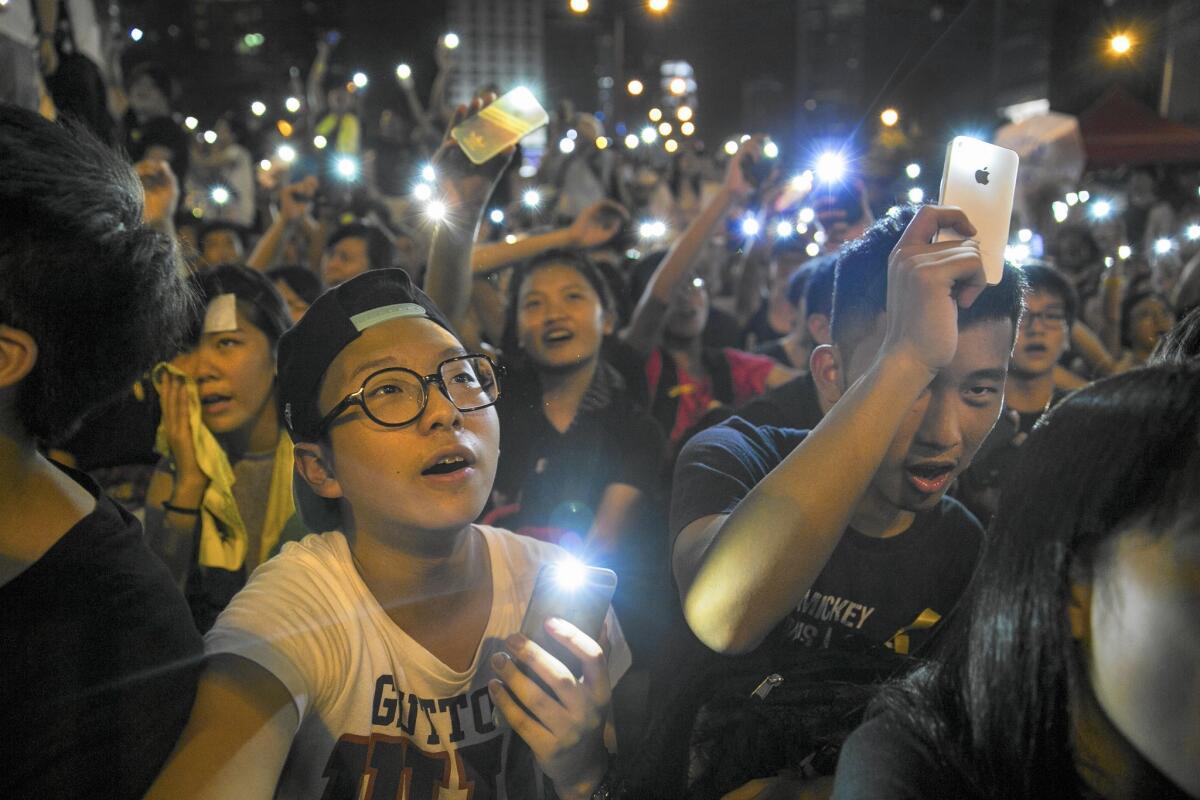In Hong Kong, pro-democracy protesters find kinship with ‘Selma’

- Share via
Reporting from Hong Kong — It may beggar the imagination that 1960s Alabama should evoke this concrete jungle of a Chinese city. Yet Hong Kong viewers of “Selma” are seeing echoes of the American civil rights struggle in their own fight for democracy.
In the film, baton-brandishing cops advance menacingly in a shroud of tear gas. Demonstrators with beat-up bedrolls and knapsacks on their backs march on the Edmund Pettus Bridge. An unarmed protester is brutalized in a dark corner by a gang of officers.
For many here, those images recall Hong Kong’s pro-democracy demonstrations last fall, when law enforcement wielded some of the same weapons and tactics as in Selma.
“I was very close to crying. Some of the scenes really reminded me of what we’ve been through — tear gas and all,” Sam Chow, a recent college graduate, said outside a theater Saturday evening. The film opened in Hong Kong last week, after two advance screenings in February.
Hong Kong, a former British territory, was promised a high degree of autonomy and certain rights for 50 years under an international treaty governing its 1997 return to Communist-run China.
In August, the standing committee of China’s legislature, the National People’s Congress, set a framework for future elections for Hong Kong’s chief executive, in effect limiting the choice of candidates to two or three approved by a nominating committee expected to be composed largely of people regarded as “pro-Beijing.”
That framework touched off the unprecedented pro-democracy demonstrations that lasted 10 weeks and saw thousands of participants clogging major thoroughfares and surrounding government headquarters. The sit-ins ended in mid-December after police, acting on a court order, cleared the streets.
For Hong Kongers, “Selma” stirred up not just memories of the fall protests but also sober — and sobering — reflections.
Chow saw the movie with seven friends, all members of one of the pro-democracy organizations that sprouted during the demonstrations.
“Looking at how [African Americans] reacted to the violent treatment, I realized it’d call for much forgiveness and courage on my part,” said Leo Kwan, who joined Chow at the theater.
“But I also wish Beijing could show the same sympathy to our cause as [President Lyndon] Johnson did toward the grievances of blacks,” he said. “The circumstances we’re facing here are very different: The U.S. is a democracy, but what we’re facing is a dictatorship.”
Rachel Lai, another member of Chow’s group, looked glum as she walked out. “The blacks in the South found strength in numbers, and they were able to move others to their cause,” Lai said. “But here, we are a small city of 7 million, and we have to move a huge China, while the rest of country doesn’t seem persuadable.”
News of the protracted protests was all but blacked out by government censors in mainland China, where citizens aren’t entitled to the freedom enjoyed by Hong Kongers. (“Selma” is not playing in mainland China.)
For its part, the local distributor of the movie, Sundream Motion Pictures Ltd., which specializes in acquiring independent foreign films and certain productions of Weinstein Co., “decided not to ride on the coattail of the [political] movement in our marketing,” said senior manager for marketing June Chan.
Even so, it didn’t shy away from politics. In the U.S., the poster read simply: “One dream can change the world.” In Hong Kong, it was spelled out and spiced up: “This March, it’s time for civil disobedience. Fear not violent suppression. Blaze the path to democracy.” (The movie’s Chinese name is not “Selma” but a nine-character mouthful: “Martin Luther King Jr.’s Road to His Dream.”)
“Selma” opened on only 19 screens in Hong Kong, considered a medium release. Its weekend earnings were only about 10% of what Disney’s “Cinderella” hauled in.
Some Hong Kong viewers said their interest in the film was stoked by rapper Common’s shout-out to Hong Kong during the Academy Awards ceremony. Accepting the trophy for best original song for “Glory” in “Selma,” Common said the bridge where King had marched connected people across the world who were fighting for better lives, including “the people in Hong Kong protesting for democracy.”
Toward the end of a Friday night screening in Hong Kong’s financial district, a few blocks from the main protest site, the film credits rolled, and the song brought tears to Wendy Wan’s eyes.
The movie, she said, made her empathize with African Americans. “We increasingly feel like the minorities, politically speaking,” Wan said.
Common isn’t the only artist involved with “Selma” who has spoken of the movie’s connection to recent events in Hong Kong.
Carmen Ejogo, who played Coretta Scott King, said in a December interview with the Los Angeles Times, “I feel there’s a sense of universality in the message. The idea of people finding their voice as a collective against the power structure is an idea that resonates in Iran, Hong Kong, Egypt, the Ukraine.”
For Arthur Chin, the translator who wrote subtitles for the movie in colloquial Chinese for Cantonese speakers, “Selma” wasn’t just another gig.
“I see my job as more than merely helping my audience relate to the film and entertaining them. I also want to make them understand how history repeats itself,” Chin said. “This could well be a dream that I have.”
Law is a special correspondent.
More to Read
Sign up for Essential California
The most important California stories and recommendations in your inbox every morning.
You may occasionally receive promotional content from the Los Angeles Times.










